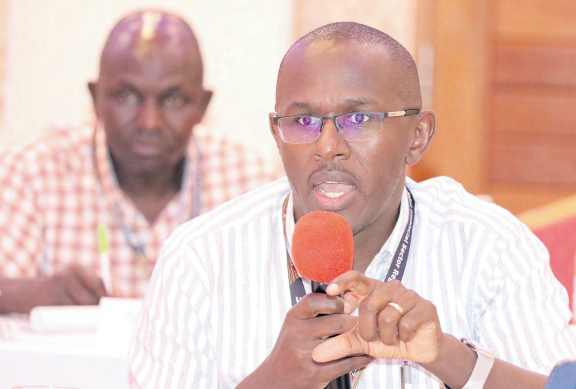
We're at a good place, our economy is better – Kindiki
DP says the lower class can now sustain themselves
The total amount of non-remitted funds owed to Regulated Saccos in 2023 was Sh2.59 billion.
In Summary

Companies are retaining employees’ statutory deductions despite slashing them from salaries as one of the survival tactics in a cash-strapped economy.
Contributors will likely miss out on essential benefits like health coverage, Sacco dividends, and loans. At the same time, retiring employees will likely go home with fewer benefits than anticipated.
A spot check by the Star at various Saccos, the National Social Security Fund (NSSF), and the recently unveiled Social Health Insurance Fund (SHIF) show several private and state firms are yet to remit billions of their employees’ contributions, with Saccos worst hit.
A chief executive of a growing Sacco whose members are drawn from various private sectors including technology, finance, media, and real estate told the Star in confidence that 10 out of 19 employers have not remitted their staff’s deductions since March.
“This is extremely worrying. Most of those firms seem unbothered. We have had numerous correspondences with them which only yield mere promises. Most of our members cannot access loan products and we fear that they might miss on dividends come February. While it is easy to blame everything on the tough economy, I wonder why it is convenient for them to pay salaries and taxes and deliberately fail to deliver funds deducted from em- ployees’ salaries,’’ he said.
Top Saccos in the country including Stima Sacco, Nation Sacco, Harambee among others are facing a similar predicament, only hoping that a law will soon be in place to punish defaulting companies.
NON-REMITTED FUNDS
The total amount of non-remitted funds owed to Regulated SACCOs in 2023 remained at a high of Sh2.59 billion compared to Sh2.67 billion in 2022; with a total of 82 Regulated Saccos and 57,721 members affected.
While there is no data on defaults by the private sector to Saccos by private entities, the state and its related agencies continue to be the greatest defaulters in remitting funds owed to regulated Saccos, offering the excuse of inadequate funding or budgetary allocations despite the defaults cascading to loans and financial stability.
Public universities and tertiary colleges owed a total of Sh958.07 million (37 per cent of the total non-remitted funds); County Governments (and Assemblies) owed a total sum of Sh865.12 million ( 33.41 percent of the total non-remitted funds); while state corporations owed a total of Sh162.89 million ( 3.08 per cent of the total non-re- mitted funds).
POLICY SHIFT
This trend has caught the eyes of the regulator, the Sacco Societies Regulatory Authority (Sasra), with the chairperson Jack Ranguma calling for a policy shift so that these funds may be deducted at source by the National Treasury, from the exchequer grants appropriated by Parliament, in favor of the defaulting government institutions, and directly remitted to the affected Saccos.
“This remains the most viable policy solution to this menace, given that employer institutions from the private sector had a relatively low proportion of non-remitted funds,” he said.
Last week, Co-operatives, Micro Small and Medium Enterprises (MSMEs) Development Cabinet Secretary Wycliffe Oparanya said the country is currently reviewing its legislative and regulatory framework within the co-operative sector via the Co-operative Bill 2024 and the Sacco Society’s Amendment Bill 2024, aimed at protecting members deposits.
“We believe that these reviews shall enable the creation of a legal and regulatory framework that protects the most critical part of co-operatives, which is the mem- ber’s deposits,” he said.
Speaking during the award ceremony for Ushirika Day Celebrations held at a Nairobi hotel, Oparanya said that Sasra has issued a ‘Whistleblowing Policy’ to promote institutional integrity and transparency by encouraging whistleblowing on misconduct, fraud, and unethical behavior, and it emphasises that every board member and employee is responsible for knowing and adhering to the policy, including reporting breaches.
He warned that the government will soon have the power to seize accounts of employers who do not remit employees’ contributions to Saccos if the proposed Bill is enact- ed into law.
“Where an employer of a person who is a member of a Cooperative has, under the instructions of the employee, made a deduction from the employee’s remuneration or payment for produce for remittance to the Cooperative concerned but fails to remit the deductions within seven days after the date upon which the deduction was made, the employer shall be liable to pay the sum deducted together with compound interest thereon at a rate of not less than five per cent per month,” the Bill says.
“The Commissioner may, by written notice, appoint any person, bank, or institution to be an agent of the Cooperative for collection and recovery of a debt owed to the Cooperative.”
A similar situation is witnessed in the pension sector, with the NSSF yet to receive billions from employees’ premiums. In its latest report, the fund said unremitted contributions from state corporations, government-owned enterprises, semi-autonomous agencies, and private entities are surging at an alarming rate estimated at 157 per cent every year since 2022.
Finance and investment analyst Andrew Ocholla is calling for tougher laws to ensure firms remit statutory deductions to safeguard the dignity of employees’ investments.
“It is fraud for companies to deduct from employees’ salaries and fail to remit, tough operating environment notwithstanding.” Gerald Kariuki, a hotel owner in Nairobi, however, wants the government to go slow on punitive laws that are likely to scare away investors, saying that firms are struggling in the depressed economy.
The majority are relying on those
deductions to invest back in tho the
company, with the hope of clearing
them in the future.

DP says the lower class can now sustain themselves